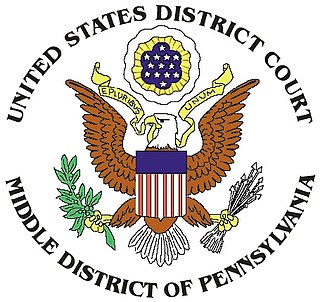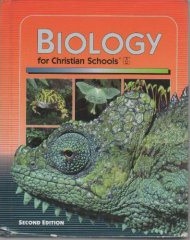Intelligent design (ID) is a pseudoscientific argument for the existence of God, presented by its proponents as "an evidence-based scientific theory about life's origins". Proponents claim that "certain features of the universe and of living things are best explained by an intelligent cause, not an undirected process such as natural selection." ID is a form of creationism that lacks empirical support and offers no testable or tenable hypotheses, and is therefore not science. The leading proponents of ID are associated with the Discovery Institute, a Christian, politically conservative think tank based in the United States.

The National Center for Science Education (NCSE) is a not-for-profit membership organization in the United States whose stated mission is to educate the press and the public on the scientific and educational aspects of controversies surrounding the teaching of evolution and climate change, and to provide information and resources to schools, parents, and other citizens working to keep those topics in public school science education. Based in Oakland, California, it claims 4,500 members that include scientists, teachers, clergy, and citizens of varied religious and political affiliations. The Center opposes the teaching of religious views in science classes in America's public schools; it does this through initiatives such as Project Steve. The Center has been called the United States' "leading anti-creationist organization". The Center is affiliated with the American Association for the Advancement of Science.

Michael Joseph Behe is an American biochemist and an advocate of the pseudoscientific principle of intelligent design (ID).

Kenneth Raymond Miller is an American cell biologist, molecular biologist, and Professor Emeritus of Biology at Brown University. Miller's primary research focus is the structure and function of cell membranes, especially chloroplast thylakoid membranes. Miller is a co-author of a major introductory college and high school biology textbook published by Prentice Hall since 1990.
The intelligent design movement is a neo-creationist religious campaign for broad social, academic and political change to promote and support the pseudoscientific idea of intelligent design (ID), which asserts that "certain features of the universe and of living things are best explained by an intelligent cause, not an undirected process such as natural selection." Its chief activities are a campaign to promote public awareness of this concept, the lobbying of policymakers to include its teaching in high school science classes, and legal action, either to defend such teaching or to remove barriers otherwise preventing it. The movement arose out of the creation science movement in the United States, and is driven by a small group of proponents.

Of Pandas and People: The Central Question of Biological Origins is a controversial 1989 school-level supplementary textbook written by Percival Davis and Dean H. Kenyon, edited by Charles Thaxton and published by the Texas-based Foundation for Thought and Ethics (FTE). The textbook endorses the pseudoscientific concept of intelligent design – the argument that life shows evidence of being designed by an intelligent agent which is not named specifically in the book, although proponents understand that it refers to the Christian God. The overview chapter was written by young Earth creationist Nancy Pearcey. They present various polemical arguments against the scientific theory of evolution. Before publication, early drafts used cognates of "creationist". After the Edwards v. Aguillard Supreme Court ruling that creationism is religion and not science, these were changed to refer to "intelligent design". The second edition published in 1993 included a contribution written by Michael Behe.
An intelligent designer, also referred to as an intelligent agent, is the pseudoscientific hypothetical willed and self-aware entity that the intelligent design movement argues had some role in the origin and/or development of life. The term "intelligent cause" is also used, implying their teleological supposition of direction and purpose in features of the universe and of living things.
The Kansas evolution hearings were a series of hearings held in Topeka, Kansas, United States from May 5 to 12, 2005 by the Kansas State Board of Education and its State Board Science Hearing Committee to change how evolution and the origin of life would be taught in the state's public high school science classes. The hearings were arranged by the Board of Education with the intent of introducing intelligent design into science classes via the Teach the Controversy method.

Barbara Carroll Forrest is a professor of philosophy at Southeastern Louisiana University in Hammond, Louisiana. She is a critic of intelligent design and the Discovery Institute.
Robert T. Pennock is a philosopher working on the Avida digital organism project at Michigan State University where he has been full professor since 2000. Pennock was a witness in the Kitzmiller v. Dover Area School District trial, testifying on behalf of the plaintiffs, and described how intelligent design is an updated form of creationism and not science, pointing out that the arguments were essentially the same as traditional creationist arguments with adjustments to the message to eliminate explicit mention of God and the Bible as well as adopting a postmodern deconstructionist language. Pennock also laid out the philosophical history of methodological and philosophical naturalism as they underpin to science, and explained that if intelligent design were truly embraced it would return Western civilization to a pre-Enlightenment state.

Kitzmiller v. Dover Area School District, 400 F. Supp. 2d 707 was the first direct challenge brought in the United States federal courts testing a public school district policy that required the teaching of intelligent design (ID), ultimately found by the court to not be science. In October 2004, the Dover Area School District of York County, Pennsylvania, changed its biology teaching curriculum to require that intelligent design be presented as an alternative to evolution theory, and that Of Pandas and People, a textbook advocating intelligent design, was to be used as a reference book. The prominence of this textbook during the trial was such that the case is sometimes referred to as the Dover Panda Trial, a name which recalls the popular name of the Scopes Monkey Trial in Tennessee, 80 years earlier. The plaintiffs successfully argued that intelligent design is a form of creationism, and that the school board policy violated the Establishment Clause of the First Amendment to the United States Constitution. The judge's decision sparked considerable response from both supporters and critics.
Larry Caldwell, a pro-intelligent design activist and attorney, has been active in bringing litigation in causes supporting the intelligent design movement. Caldwell along with his wife, Jeanne Caldwell a Christian school teacher who "takes the Bible literally" previously operated Quality Science Education for All, and are currently appealing to the Supreme Court of the United States an Establishment Clause of the First Amendment suit against the University of California, Berkeley.
The intelligent design movement has conducted an organized campaign largely in the United States that promotes a pseudoscientific, neo-creationist religious agenda calling for broad social, academic and political changes centering on intelligent design.
People for Legal and Non-Sectarian Schools (PLANS) is an organization based in California in the United States which campaigns against the public funding of Waldorf methods charter schools alleging they violate the United States Constitution's separation of church and state. The group claims independent Waldorf schools and public Waldorf methods charter schools teach anthroposophical content, that this content is religious in nature, and that the schools disguise the anthroposophical content from the public. PLANS filed federal suit in 1998 against two California public school districts, Sacramento City Unified School District and Twin Ridges Elementary School District, to halt the Waldorf methods educational programs implemented in two of their schools. The case was ultimately dismissed on its merits in 2012.

Uncommon Dissent: Intellectuals Who Find Darwinism Unconvincing is a 2004 anthology edited by William A. Dembski in which fifteen intellectuals, eight of whom are leading intelligent design proponents associated with the Discovery Institute's Center for Science and Culture (CSC) and the International Society for Complexity, Information and Design (ISCID), criticise "Darwinism" and make a case for intelligent design. It is published by the publishing wing of the paleoconservative Intercollegiate Studies Institute. The foreword is by John Wilson, editor of the evangelical Christian magazine Christianity Today. The title is a pun on the principle of biology known as common descent. The Discovery Institute is the engine behind the intelligent design movement.

Association of Christian Schools International v. Stearns, 678 F. Supp. 2d 980, was filed in spring 2006 by Association of Christian Schools International against the University of California claiming religious discrimination over the rejection of five courses as college preparatory instruction. On August 8, 2008, Judge S. James Otero entered summary judgment against plaintiff ACSI, upholding the University of California's standards.

Biology for Christian Schools is a 1991 school-level biology textbook written from a Young Earth Creation point of view by William S. Pinkston and published by the Bob Jones University Press. The book has been controversial because it espouses the idea of Biblical inerrancy; that whenever science and Christianity conflict, the current scientific understanding is wrong. The book promotes creationism, which is rejected by the National Academy of Sciences, the National Association of Biology Teachers and the National Science Teachers Association who state creationism and intelligent design are pseudoscience.
John Freshwater is a former science teacher at Mount Vernon Middle School in Mount Vernon, Ohio, who was dismissed by the Board of Education for teaching creationism in a public school.

Samuel James Otero is a former United States district judge of the United States District Court for the Central District of California.
The relationship between intelligent design and science has been a contentious one. Intelligent design (ID) is presented by its proponents as science and claims to offer an alternative to evolution. The Discovery Institute, a politically conservative think tank and the leading proponent of intelligent design, launched a campaign entitled "Teach the Controversy", which claims that a controversy exists within the scientific community over evolution. The scientific community rejects intelligent design as a form of creationism, and the basic facts of evolution are not a matter of controversy in science.









